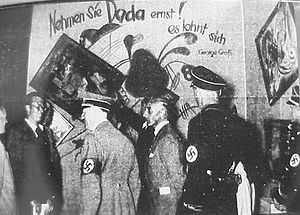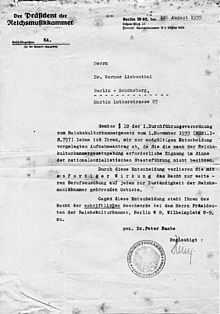Reichskulturkammer
The Reichskulturkammer (RKK) ("Reich Chamber of Culture") was an institution in Nazi Germany. It was established by law on 22 September 1933 in the course of the Gleichschaltung process at the instigation of Reich Minister Joseph Goebbels as a professional organization of all German creative artists.[1] Defying the claims raised by the German Labour Front (DAF) under rival Robert Ley, it was meant to gain control over the entire cultural life in Germany creating and promoting Aryan art consistent with Nazi ideals.

Every artist had to apply for membership on presentation of an Aryan certificate. A rejected inscription de facto resulted in a profession ban.
The RKK was affiliated with the Ministry of Public Enlightenment and Propaganda with its seat in Berlin. Headed by Goebbels himself, a state secretary of his ministry served as vice president:
- Walther Funk (1933-1938)
- Karl Hanke (1938-1941)
- Leopold Gutterer (1941-1944)
- Werner Naumann (1944-1945)
SS officer Hans Hinkel was one of the officers in charge of the chamber and Goebbels' special commissioner for the removal of Jews from German cultural life.
Different subdivisions of the RKK dealt with music, visual arts, film, architecture, and literature, organized in seven departments:
- Reichsrundfunkkammer (until 1939)
- Reichsfilmkammer, headed by Carl Froelich from 1939
- Reichsmusikkammer, headed by Richard Strauss, from 1935 by Peter Raabe
- Reichskammer der bildenden Künste (Reich Chamber of Fine Arts) (de), 1933-35 headed by Eugen Hönig, from 1936-1943 by Adolf Ziegler
- Reichstheaterkammer
- Reichsschrifttumskammer, headed by Hans-Friedrich Blunck, from 1935 by Hanns Johst
- Reichspressekammer, headed by Max Amann
Degenerate art



One notable project of the RKK's bildende Künste (visual arts) division was the Entartete Kunst touring exhibition, of works deemed "degenerate."[2] The exhibitions were held in major German cities such as Munich and Berlin, and attendance was measured in the millions, largely because entrance was free, and the so-called degenerate art perhaps more popular with the public than the nazis anticipated. Goebbels had supported German expressionists until Hitler intervened and expressed his disgust at artists such as Max Liebermann and Emil Nolde.
References
- ↑ "Culture in the Third Reich: Overview". Holocaust Encyclopedia. United States Holocaust Memorial Museum. June 10, 2013. Retrieved 9 March 2014.
- ↑ "Culture in the Third Reich: Disseminating the Nazi Worldview". Holocaust Encyclopedia. United States Holocaust Memorial Museum. June 10, 2013. Retrieved 9 March 2014.